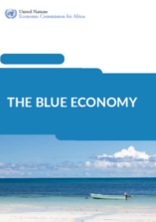The Blue Economy

The concept of the Blue Economy integrates a new approach to the economic exploitation of the resources of our oceans, lakes, rivers and other bodies of water.
Alongside the “green economy”, it represents a basis for rational and sustainable use of natural resources, both renewable and non-renewable. For the Eastern African sub-region, the Blue Economy has assumed a special significance, since the sub-region spans the entire central belt of the continent of Africa, reaching from the Western Indian Ocean to the Atlantic, and taking in the vast aquatic reserves of the Great Lakes.
The significance of the Blue Economy for the sub-region was recognised by the Intergovernmental Committee of Experts at its 19th meeting in Antananarivo from 2-5 March, 2015. At that meeting, organised by UNECA’s Sub-Regional Office for Eastern Africa (SRO-EA), it was decided that an effort should be undertaken by SRO-EA to evaluate the opportunities inherent in a Blue Economy approach, while examining the challenges associated with key areas of economic endeavour in the sub-region. The areas of economic activity to be analysed – natural-resource management, maritime transport, energy, fisheries and tourism – were chosen because of their significance to the communities of the sub-region, their development potential and their importance to a Blue Economy strategy. To place these areas in context, the report presented here also includes analysis of the macro-economy of the sub-region and the Western Indian Ocean, relevant geopolitical issues and regional networks that can be used to support a Blue Economy approach to economic development.
The result is a remarkable catalogue of the opportunities and challenges associated with adopting a Blue Economy strategy for economic and social development in the Eastern African sub-region. The story told here reveals possibilities for inclusive and integrative development that has evaded policy makers hitherto. This is especially important in the context of the accelerated growth that many countries in Africa are experiencing without any concomitant reduction in poverty or significant rise in prosperity. When considered alongside the prospects for sustainable and inclusive growth already identified by a green-economy approach, the conclusions of this report represent hope for policy makers and the peoples of the region. The rich and varied ecosystems that are connected and interconnected with each other, reaching far into the hinterland and linking two oceans, can provide a basis for development that is at the same time inclusive and sustainable.
It is now up to policy makers and the international community to seize the opportunities identified and presented in this report.